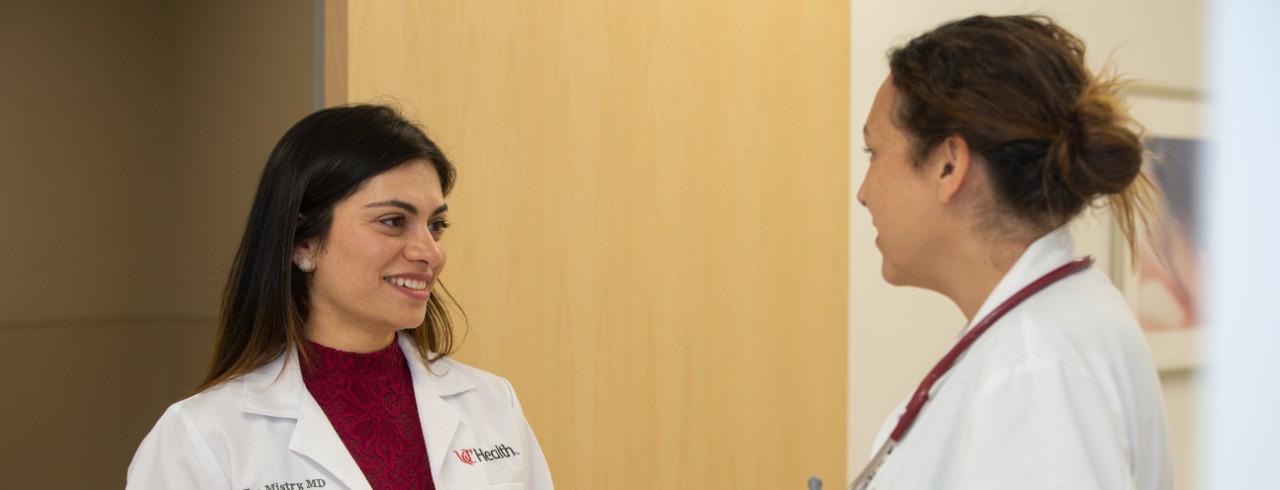
Fox 19: May is American Stroke Month
The University of Cincinnati's Eva Mistry, MBBS, joined Fox 19's morning show to discuss American Stroke Month.
Mistry said it is important to remember the FAST acronym for stroke (see box below).
"The most important thing to remember about strokes is that they happen suddenly," said Mistry, assistant professor in the Department of Neurology and Rehabilitation Medicine in UC’s College of Medicine and a UC Health physician at the UC Gardner Neuroscience Institute. "It hits you like lightning, and so if any of these [symptoms] happen suddenly, you have to call 911 because it’s a time critical event. And it may also happen in your sleep. So you may wake up with these symptoms, but the action plan remains the same. Call 911."
While there is progress being made in treating strokes, prevention and avoiding strokes altogether is the best treatment. Managing blood pressure and cholesterol and aiming to get about 7-9 hours of sleep per night are prevention tools everyone can take to lower their risk of stroke.
"It is a life long, cumulative risk, if you will. So how you take care of your heart health in general which is tied very closely to brain health matters over the time of years," Mistry said. "It’s an accumulation of what you have done over the years that really matters in terms of stroke prevention and heart health generally."
Featured photo at top of Mistry, left, and Stacie Demel, DO. Photo/Andrew Higley/UC Marketing + Brand.
Remember how to identify a stroke
Because of the quick onset of stroke, it is important to know the FAST mnemonic device that details the most common signs of stroke and how to respond:
- F: Facial drooping
- A: Arm or leg drop, or weakness in the arm or leg
- S: Speech issues, such as slurred speech or an inability to get your words out
- T: Time is of the essence; call 911 immediately
Related Stories
Designing the next generation of drug delivery
July 18, 2024
UC Assistant Professor Briana Simms talks to PhRMA about using nanoparticles to deliver medicine.
Mural by UC grad honors U.S. military history
July 17, 2024
Local 12 highlighted a new mural by University of Cincinnati graduate and artist Brandon Hawkins that pays tribute to U.S. military history.
Social media fuels extreme political rhetoric
July 17, 2024
UC College of Arts and Sciences Professor Jeffrey Blevins tells Local 12 that online algorithms fuel political polarization on social media.
Camp aims to empower children, teens who stutter
July 17, 2024
A one-week, evidence-based program for children and teens who stutter at the University of Cincinnati will teach kids to communicate effectively, advocate for themselves and develop confidence about their communication abilities. Camp Dream. Speak. Live., which is coming to Cincinnati for the first time July 22-26, began in 2014 at the University of Texas at Austin. The Arthur M. Blank Center for Stuttering Education and Research at UT expects to serve more than 2,000 children at camps across the United States, Africa, Asia and Europe this year.
UC Blue Ash takes next step in major renovation project
July 17, 2024
Muntz Hall, the flagship building on the University of Cincinnati Blue Ash College campus, is in the next phase of a major renovation project that will dramatically transform the main entrance, enhance access to student support services and add new spaces for students to study or meet between classes.
From intern to full-time: Recent Lighting Design grad joins Bandit Lites
July 16, 2024
Lighting & Sound America spotlights recent graduate Riley Rowan's new position at Bandit Lites, a full-service design, management and producer of live events and entertainment.
CCM alum Donald Lawrence to be inducted into Cincinnati Black Music Walk of Fame
July 16, 2024
UC College-Conservatory of Music alumnus Donald Lawrence is part of the 2024 class of Cincinnati Black Music Walk of Fame inductees. Located at the Banks in downtown Cincinnati, the induction ceremony on July 27 will feature a parade of stars and a free concert by the Zapp Band.
U.S. stroke survival is improving, but race still plays role
July 16, 2024
U.S. News & World Report, HealthDay and Real Health covered new research from the University of Cincinnati that found overall rates of long-term survival following stroke are improving, but Black individuals experience worse long-term outcomes compared to white individuals.
Collaborative pianist and vocal coach Kirill Kuzmin joins CCM’s faculty
July 16, 2024
UC College-Conservatory of Music Interim Dean Jonathan Kregor has announced the addition of Kirill Kuzmin to the college’s faculty of distinguished performing and media arts experts, researchers and educators. A Grammy-nominated collaborative pianist and vocal coach, Kuzmin begins his new role as Associate Professor of Opera/Vocal Coaching on Aug. 15, 2024.
My incredible first year at Cincinnati Law: Journey, reflections and highlights
July 16, 2024
Dean Haider Ala Hamoudi gives a progress report on his first year as dean of the College of Law.
